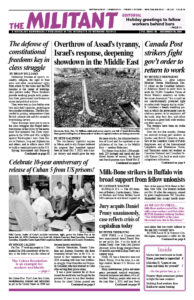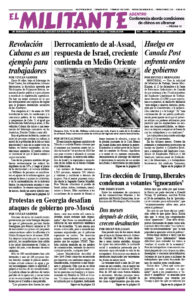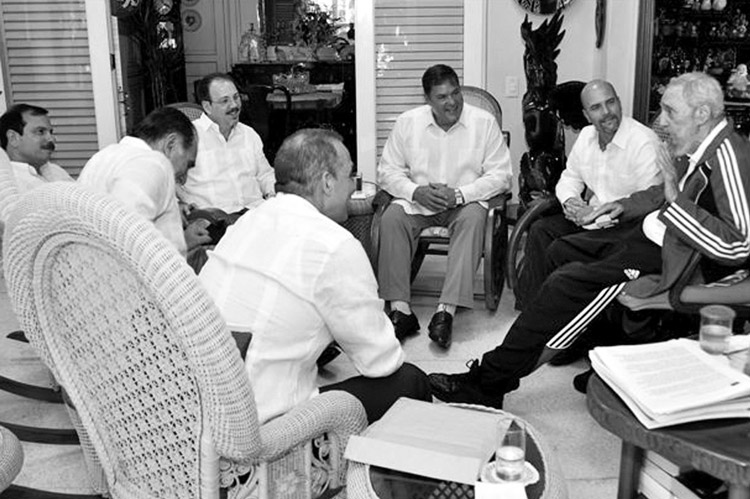On Dec. 17 working people in Cuba marked the 10th anniversary of the victory in the battle to win the release of the Cuban Five. That’s how five Cuban revolutionaries arrested and railroaded to jail in the United States in 1998 had become known worldwide.
Gerardo Hernández, Ramón Labañino and Antonio Guerrero, the three remaining behind bars in the U.S., returned to their homeland that day in 2014, reuniting with their two brothers-in-struggle, René González and Fernando González, who had returned to Cuba after serving their prison terms.
It was a great moment for all those around the world who had fought for the previous 16 years to win their freedom. Across the island Cubans poured into the streets from factories, schools and offices to express their joy. Supporters around the world joined in celebration.
Our return was “like a chess game that only a revolution like ours can play, one that has the pride of having faced the biggest empire in the world and has not kneeled down before it,” said Hernández at a Dec. 17 gathering this year in Havana attended by the Five, Cuban leader Raúl Castro, and President Miguel Díaz-Canel to mark the victory.
The Five were arrested in predawn FBI raids in Florida, under the direction of the Bill Clinton administration, on frame-up charges of espionage. But they had no evidence to convict them on this, so Clinton’s Justice Department resorted to trumped-up conspiracy charges, and, in the case of Hernández, conspiracy to commit murder. In fact, the Five had come to the U.S. to gather information on paramilitary forces in southern Florida with a long history of violent attacks on Cuba and against supporters of the Cuban Revolution in Puerto Rico and the U.S.
Five reinforced U.S. workers’ fights
The Five’s revolutionary record and their conduct in the trial and in prison won them respect and admiration among workers inside and outside prison walls. They rejected both threats and enticements made by government agents and prosecutors trying to convince them to cop a plea to crimes they never committed.
Their fight helped shine a spotlight on the class character of capitalist “justice” experienced firsthand by millions of working people in the U.S. — from the brutality of cops and prison guards to denial of trial by a jury of your peers and any semblance of presumption of innocence. Labañino appropriately described it as “an enormous machine for grinding people up.”
Over their years in prison, the Five learned about the class struggle in the United States. “We lived in a microcosm of the outside world,” said Hernández in an interview published in the book It’s the Poor Who Face the Savagery of the US ‘Justice’ System, one of a number of publications put out by Pathfinder Press as part for the fight for their freedom.
Their jail mates learned about Cuba’s socialist revolution and its internationalist example. Three of the Cuban Five were among the 425,000 Cuban volunteers who went to Angola to defend that country against an invasion by South Africa. The blows dealt to the hated apartheid regime helped free Nelson Mandela and end its rule.
From the beginning of the fight for the Five’s release, the Militant helped week in and week out to get out the truth about the defense campaign and about Cuba’s socialist revolution. Members of the Socialist Workers Party helped organize events and art exhibitions in community centers, libraries, union halls and elsewhere, explaining who they were and what they stood for.
“Your unwavering strength, dignity, honesty, creativity — and humor — have shown the world what it means to be a revolutionary. What it means to be a communist,” Socialist Workers Party National Secretary Jack Barnes wrote to the Cuban Five and to the Central Committee of the Communist Party of Cuba upon their release.
‘Ours was a fight in defense of Cuba’
“It was always clear to us that the fight for justice in our case was a fight in defense of Cuba,” wrote René González in September 2012. It was simply “an extension of the confrontation between those who claim the prerogative to attack Cuba and those of us who believe in Cuba’s right to defend itself.”
In 2014, recognizing the failure of 11 previous U.S. administrations to make the Cuban people submit to Washington’s dictates through economic strangulation, the Barack Obama administration said it would turn to “different methods” to topple Cuba’s socialist revolution. As part of this shift, Obama agreed to the release of the Five, in exchange for Cuba’s release of U.S. agents.
Obama decided he could press Washington’s moves against Cuba best by reestablishing diplomatic relations between the two countries and to ease some of its economic pressure.
“This in no way means that the heart of the matter has been solved,” Cuban President Raúl Castro said Dec. 17, 2014, as the three Cuban revolutionaries returned to Cuba. “The economic, commercial, and financial blockade, which causes enormous human and economic damages to our country, must cease.”
When Obama’s “different methods” failed to make a dent in the support of the Cuban people for their socialist revolution, Washington moved to resume and deepen its economic war on them. Over the next decade, Donald Trump’s White House imposed some of the most draconian economic and political measures yet taken against the Cuban people — and Joseph Biden’s administration has maintained them.
Upon their return, the Cuban Five spoke to audiences across the island sharing their experiences. “Everything that happened is not about us as individuals,” Guerrero said at a 2015 presentation to young university students in Havana on Absolved by Solidarity, another book published by Pathfinder. “It’s the Cuban people, who we represent. The standing we gained represents the resistance of our people.”
“In carrying out their work, none of the Five Heroes sought applause, rewards or fame,” Cuban leader Fidel Castro told the press March 1, 2015, after meeting with them. “They received their distinctions because they didn’t seek them.” A week earlier the Five had been awarded the distinction of being “Heroes of the Republic of Cuba.”
Today, all five have taken on leadership roles in working to advance Cuba’s socialist revolution.


